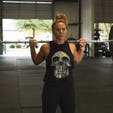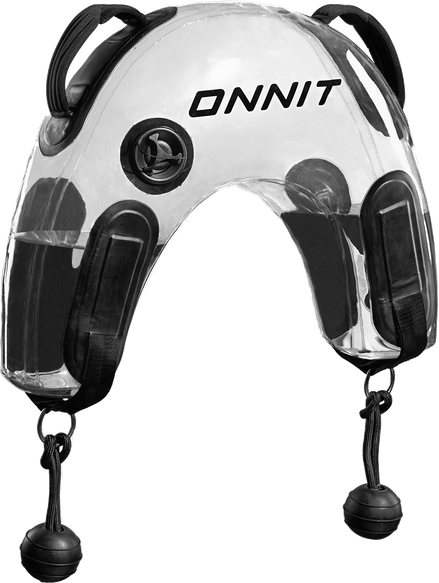Bruce Lee famously likened a well-rounded martial artist to water. “Water can flow or it can crash,” he said. “Be water, my friend.”
If you want to build a stable, strong, and explosive body, the same advice applies, although perhaps a little more literally. The HydroCore Bag harnesses the power of water for a variety of training effects that you can’t get from conventional gym tools.
What Is The HydroCore Bag?
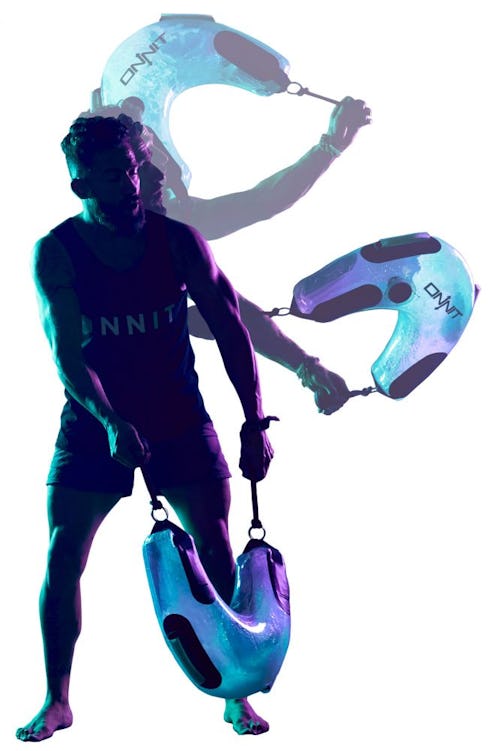
The HydroCore Bag is a training implement invented by Maurizio Tangari, a trainer to MMA fighters, military personnel, and celebrities. It was inspired by a similar tool, the Bulgarian Bag®, which is an evolution of a traditional training method used by old-time Eastern European wrestlers—carrying small farm animals across the back of the shoulders to develop functional strength, stability, and endurance.
Thankfully, in the wake of advancing technology—and animal cruelty laws—there’s no need to tote squirming livestock anymore. The HydroCore bag is here. A plastic bladder in the shape of a yoke—the harness that attaches to oxen and other animals—the HydroCore bag is loaded with water (while the Bulgarian Bag used sand®). When you lift it to perform any number of exercises (some of which are shown below), the water sloshes around in the bag. This creates an effect known as water dynamics. Controlling the movement of the water in the bag, rather than it controlling you, trains various athletic qualities.
What Are The Benefits of HydroCore Bag Training?
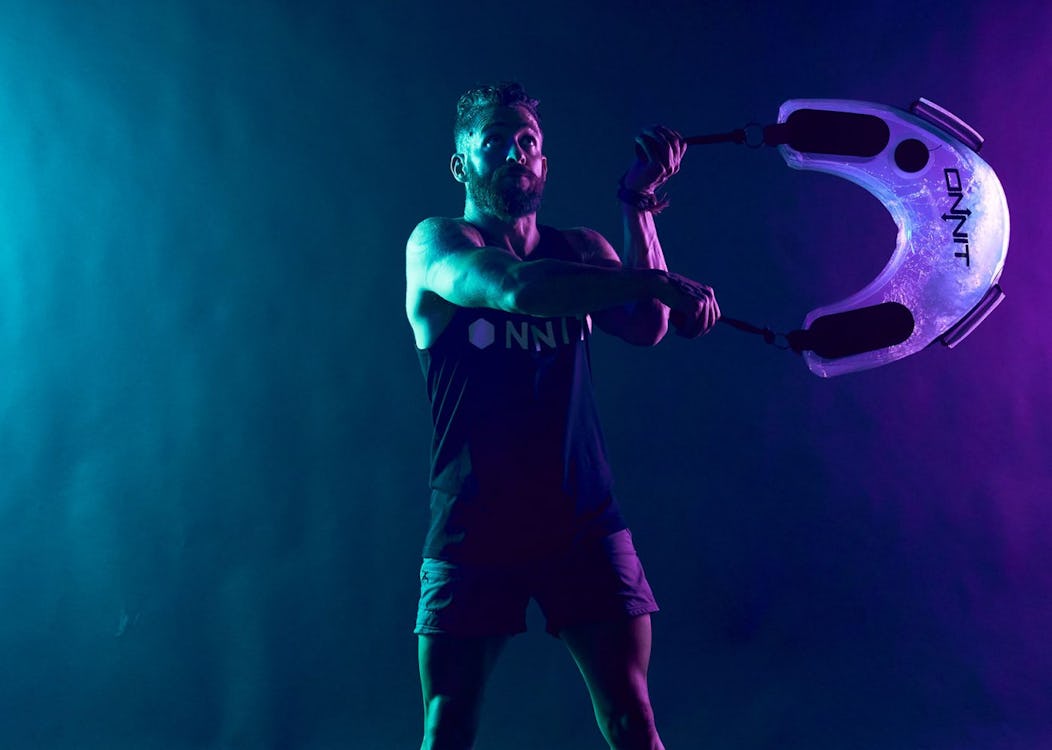
The HydroCore Bag is a formidable addition to anyone’s training arsenal, especially if you’re an athlete or martial artist. Here’s a rundown of what the bag can do.
Builds Rock-Solid Stability
As the water moves around inside the bag, it’s going to threaten any position you put your body in. To maintain control of the bag, your body alignment, and your exercise form, you’ll have to be hyper-aware of all three, and brace all your movements hard. As a result, you’ll develop tremendous stability and balance. “The bag forces core engagement without having to think about it,” says Tangari. “If I’m training you, I don’t have to constantly remind you to keep your core tight.” If it isn’t, you’ll feel yourself losing control during the set, which leads us to point number two.
Improves Exercise Technique
Performing exercises properly is the only way to progress on them indefinitely and stay injury-free. The HydroCore Bag all but ensures you use good technique on any movement you perform, because if you don’t, you’ll recognize it pretty fast. Performing dynamic moves like the pendulum are virtually impossible to do if your form is off, so you’ll be able to identify your mistakes and correct them immediately. In the pendulum, for instance, in which you swing the bag laterally, you’ll learn to move with the momentum of the water. If your timing isn’t right, the bag will be much harder to control. When you’ve got it down, the movement will flow, and you’ll know your form is good.
Better technique on bag exercises will also translate to better technique in other lifts you do, as your body awareness and stability improve.
“For any bag training you do,” says Tangari, “start by trying to prevent the water from sloshing.” Keeping the bag “quiet” will force you to move more deliberately and intentionally, maximizing stability. As you get more accustomed to how bag training feels, you can purposely shake the bag as you perform your lifts to create more perturbation that activates even more stabilizer muscles.
Boosts Strength and Explosiveness
The HydroCore Bag can be used for a wide range of movements, but it lends itself best to dynamic, explosive exercises like clean, snatch, and swing variations. The advantage to performing these kinds of moves with the bag versus a barbell is the offset load provided by the water and the bag’s shape. Rather than accelerate and absorb the force of a perfectly balanced implement (like a barbell), you have to accommodate the constant shifting of the water in the bag. This makes training a little more real-world and applicable to sports like football, MMA, and wrestling, where you have to overcome the opposing forces of a live, resisting adversary.
The bag is also durable enough that you can throw it—perfect for wrestlers or other grapplers who need to suplex an opponent from time to time. Training to produce force quickly without having to decelerate it at the end of the range of motion (as you do with a barbell clean, snatch, jerk, etc.) allows you to maximize power development. In other words, when you throw the bag, you don’t have to slow it down like you do when training barbell lifts. Toss it as hard as you can and let it go. You wouldn’t slow down when expressing power on the field or the mat, so why limit your potential by training that way?
“The HydroCore bag will move faster around your body than any other implement,” says Tangari, including sandbags, kettlebells, or a steel mace. So the challenge it presents your muscles in starting and overcoming inertia is unique.
In addition to power, most athletes need greater grip strength and holding onto the bag while it’s moving and shaking provides a serious test. The Bulgarian Bag® was a pioneering tool for grip development, but we think the HydroCore is even better. Ball stoppers on the ends of the handles prevent slippage and increase safety, making the HydroCore easier to handle for people who are new to dynamic bag training. For variability in grip, there are also handles around the center of the bag on the front. You can hold the bag in several different positions and orientations to customize the intensity of your workout.
Light-Weight and Easy To Transport
The HydroCore bag makes for a highly portable, all-in-one gym, so it’s perfect for people who travel frequently and can’t find time or places to train on the road. When empty, it’s virtually weightless, and easily folds into a suitcase. To fill it, you need only a bathtub faucet, garden hose, swimming pool, or ocean/lake/stream. “Ten pounds of water is enough for most people to start,” says Tangari, which only fills the bag about one-quarter full. “More than that sacrifices the instability factor,” and makes it more like lifting a heavy sandbag. (However, if you choose to, and your strength allows it, the bag can be filled to provide 30 pounds of resistance.)
Because the bag provides such a good workout with minimal loading, a man and woman can use the same weight and both can get in a great session; beginners can work out alongside advanced trainees. Tangari often takes his clients to the beach, fills up the bag in the ocean, and trains a group right there on the sand.
It’s Fun!
Training with the HydroCore doesn’t feel like lifting weights or doing cardio. It feels like you’re playing with a toy. You can work your muscles and your heart without thinking about it too hard. Focus on controlling and/or moving with the water, and workouts will seem like a game.
Sample HydroCore Bag Workouts
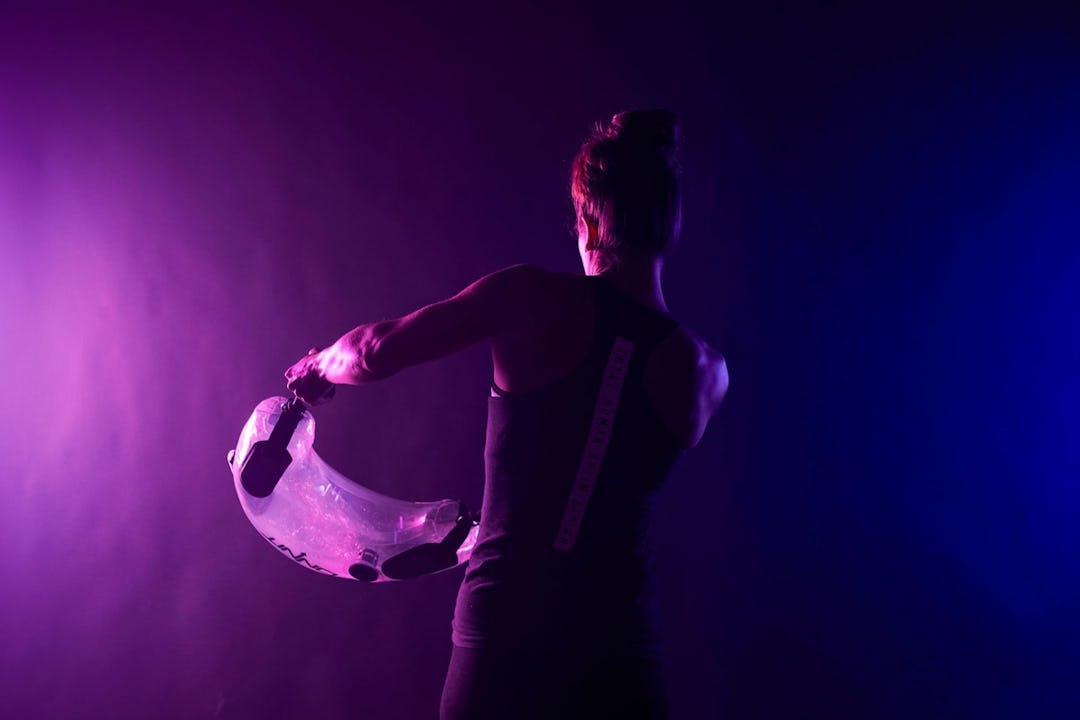
The following workouts will give you a taste of what HydroCore Bag training is like. Start with one of the beginner routines if you’ve never worked out with the HydroCore Bag, a Bulgarian Bag®, or a sandbag before. If you’re more experienced with bag training, skip ahead to the advanced bag workout. Fill the bag ¼ full for the beginner routine, and ½ full for the advanced.
Beginner Bag Workout, Option A
Perform each exercise in sequence. For each move, perform reps for 20 seconds and then rest 10 seconds. That’s one round. Repeat for 3–5 rounds.
1. Lunge With Twist
Step 1. Hold the front of the bag in front of your chest with your hands up through the rubber handles. Try to keep the bag parallel to the floor throughout the exercise.
Step 2. Take a big step forward and lower your body into a lunge—your rear knee should end up just above the floor and the thigh of the lunging leg should be parallel to the floor.
Step 3. As soon as your foot touches down, smoothly twist your body in the direction of your front leg. Stabilize the bag, and keep your torso upright. Step back to the starting position. Repeat on the opposite leg.
2. Pushup On Bag
Step 1. Place the bag on the floor with the horn ends pointing toward you. Get into pushup position with your hands on the bag and brace your body.
Step 2. Keeping your head, spine, and pelvis in a straight line, lower your body until your chest touches the bag, and then press back up.
3. Bent-over Row
Step 1. Hold the bag by the sides with arms extended, and bend your hips back while keeping your head, spine, and pelvis in a straight line. Your torso should end up nearly parallel to the floor.
Step 2. Row the bag to your belly explosively, drawing your shoulder blades down and together as you pull. The row will cause the water to slosh around inside the bag—stabilize it, and keep your balance.
Beginner Bag Workout, Option B
Perform each exercise in sequence. For each move, perform reps for 20 seconds and then rest 10 seconds. That’s one round. Repeat for 3–5 rounds.
1. Bag Squat To Press
Step 1. Hold the bag in front of your chest and stand with feet between hip and shoulder-width apart.
Step 2. Sit back and squat down as deeply as you can while keeping your head, spine, and pelvis in a straight line. Squeeze your glutes as you come back up to standing.
Step 3. Press the bag overhead to lockout while keeping your ribs down and core engaged.
2. Suitcase Row
Step 1. Stand on a box or bench to create some distance between you and the floor. Hold the bag by one of the rubber handles and bend your hips back as described in the bent-over row above.
Step 2. Row the bag to your side explosively, controlling the sloshing of the water. Don’t let your torso twist or bend to either side. Perform reps for 10 seconds and then switch sides and repeat.
Advanced Bag Workout
Perform each exercise in sequence. For each move, perform reps for 45 seconds and then rest 10 seconds. That’s one round. Repeat for 3–5 rounds. If you get fatigued, slow your pace, but don’t end the set before time is up.
1. Halo
Step 1. Hold the bag by its sides and make circles over and around your head. Alternate directions. Keep your ribs drawn down and your core engaged, and avoid bending or twisting your torso.
2. Pendulum Swing
Step 1. Stand with feet shoulder-width apart and hold the bag by the rope handles. Pivot on your right foot as you swing the bag laterally to your left. Duck your torso under slightly as you twist so that the bag wraps around your upper back.
Step 2. Reverse the direction and swing the bag to the other side.
3. One-Arm Overhead Press
Step 1. Hold the bag in one hand at shoulder level with the horns pointing downward.
Step 2. Keeping your ribs down and core braced, press the bag overhead. Perform reps for 20 seconds on one side, and then switch sides and repeat.
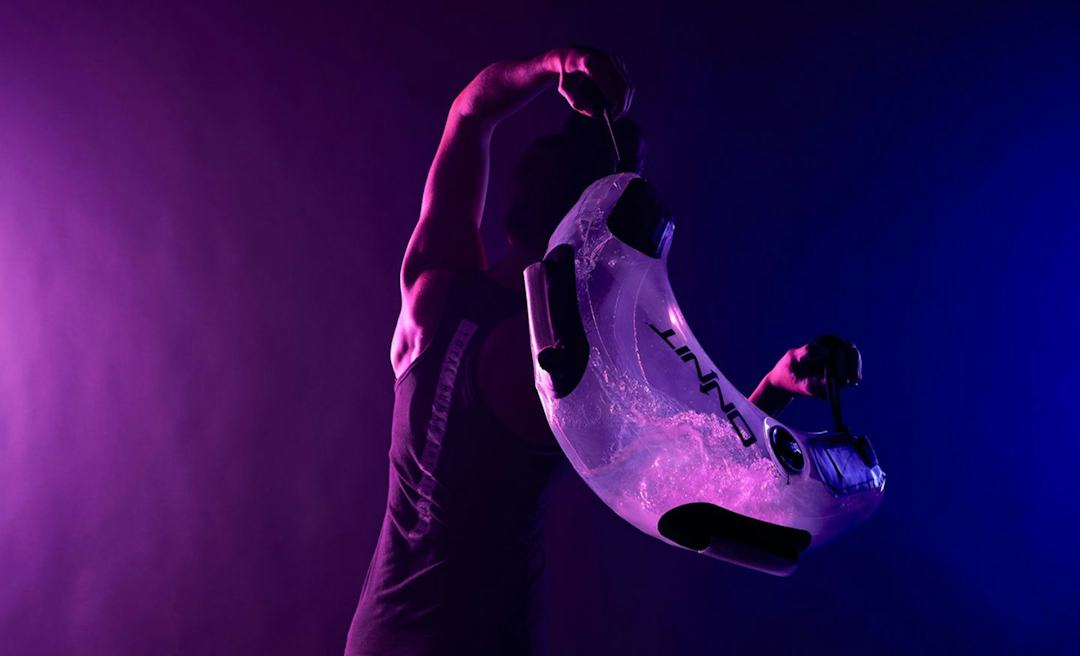
)



